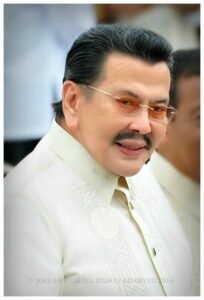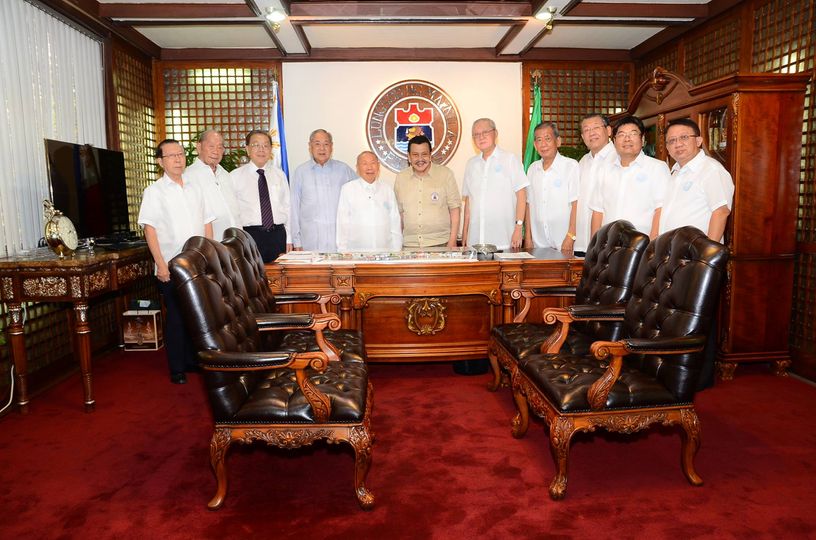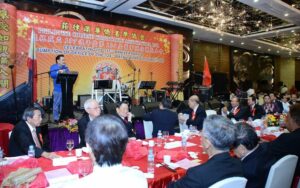Former Philippine President Joseph Ejercito Estrada
 Actor turned businessman and politician Joseph Ejercito Estrada was the 13th President of the Republic of the Philippines. Unlike most leaderships borne from a political lineage, former President “Erap,” a name which he is popularly identified with, had only his charms and charisma to carry him towards success in his professional and political career.
Actor turned businessman and politician Joseph Ejercito Estrada was the 13th President of the Republic of the Philippines. Unlike most leaderships borne from a political lineage, former President “Erap,” a name which he is popularly identified with, had only his charms and charisma to carry him towards success in his professional and political career.
His educational background has nothing to boast of since he has been known for his notoriety in secondary and tertiary schools being a dropout. However, such experiences did not hinder him from proving to himself that of which he could do his best.
As an actor, he had made a name for himself in the movie industry by being among the most loved actors during his time. He had won several FAMAS Best Actor awards for movies such as Markang Rehas in 1962, Geron Busabos in 1964, Ang Batang Quiapo in 1965, Ito Ang Pilipino in 1966, Patria Adorada in 1969, and Kumander Alibasbas in 1981, the same year that he was conferred the FAMAS Hall of Fame Awards. Other awards won by the former President include the Metro Manila Film Festival Best Actor for Diligin Mo ng Hamog ang Uhaw na Lupa in 1975 and the GMMSF Box-Office Entertainment Awards for Government Service in 2014.
Beyond the film industry, President Erap was also recognized by various award-giving bodies for his exemplary works as a politician and civil servant. Among these include recognitions as One of the Three Outstanding Young Men (TOYM) in Public Administration conferred by the Philippine Jaycees in 1989; as an Outstanding Mayor and Foremost Nationalist by the Inter-Provincial Information Service in 1971; as One of the Three Outstanding Senators of the Year conferred by the Free Press of the Philippines in 1972; as the Most Outstanding Metro Manila Mayor conferred by the Princeton Poll in 1973; and as Most Outstanding Citizen of San Juan in 2007.

His engagement in politics began when he was first elected as San Juan’s Mayor in 1969, a position in which he served the longest in his entire political career, from 1969 to 1986. In between these years, he founded the Movie Workers Welfare Foundation (MOWELFUND) and the MOWELFUND Film Institute in 1974 and 1979, respectively; and together with Guillermo de Vega, he co-founded the 1st Metro Manila Film Festival in 1975.
Following his career as Local Chief Executive of the City Government of San Juan, he then ran for a seat in the Senate and became a Senator from 1987 to 1992. As a Senator, he chaired the Committee on Public Works and was elected as Vice-Chair of the Committee on Health, Natural Resources, Ecology, and Urban Planning. After serving one full term in the Senate, he ran for higher office and was elected as Vice President in 1992, which he held thru 1998. Concurrent as Vice President, he was appointed as Presidential Adviser for Crime Prevention and Law Enforcement and as Chair of the Presidential Anti-Crime Commission (PACC) from 1992 thru 1997.
The height of his political career brought him to the highest position in the government when he was elected as the 13th President of the Republic of the Philippines in 1998.
President Erap is reckoned as one of the most loved Presidents of the Philippines, owing not only to his innate charisma but perhaps to being identified as a hero of the masses largely owed the roles he had portrayed in films over the years.

As a politician, he has proven himself worthy of respect and esteem for being diligent in his tasks and campaigns against crime, an effort recognized by leaderships of neighboring and western countries alike. His openness to building friendly relations that goes beyond politics and ideology is perhaps one that is admired by countries like China and others.
The Award for Promoting Philippines-China Understanding (APPCU) recognizes former President Joseph Ejercito Estrada for his continuous efforts in supporting the Filipino-Chinese community locally by acknowledging their valuable contributions to the Philippine economy and nation-building. Furthermore, APPCU likewise recognizes the former President’s vocal expression of support and cooperation with China as a regional partner in Asia and the ASEAN member countries.
